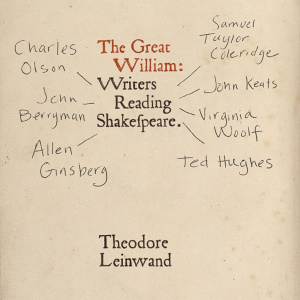Free Folger Friday: Theodore Leinwand on Writers Reading Shakespeare (2016): Difference between revisions
No edit summary |
No edit summary |
||
| (9 intermediate revisions by the same user not shown) | |||
| Line 1: | Line 1: | ||
'''''Free Folger Friday: Theodore Leinwand on Writers Reading Shakespeare''''', one of the [[Talks and Screenings at the Folger]], was held at the [[Folger Theatre]] on Friday, October 14, 2016 at 6:00pm. | '''''Free Folger Friday: Theodore Leinwand on Writers Reading Shakespeare''''', one of the [[Talks and Screenings at the Folger]], was held at the [[Folger Theatre]] on Friday, October 14, 2016 at 6:00pm. | ||
[[File:The Great William Book Cover square cropped.jpg| | [[File:The Great William Book Cover square cropped.jpg|300px|right]] | ||
'''Theodore Leinwand''', author, University of Maryland professor of English, and consulting editor for [https://shakespearequarterly.folger.edu/?_ga=2.254344655.65928868.1588000148-1025840836.1576560196/ ''Shakespeare Quarterly''], visited the Folger to discuss his new book ''The Great William: Writers Reading Shakespeare''. | |||
''The Great William'' explores how seven renowned writers—Samuel Taylor Coleridge, John Keats, Virginia Woolf, Charles Olson, John Berryman, Allen Ginsberg, and Ted Hughes—wrestled with Shakespeare in the very moments when they were reading his work | ''The Great William'' explores how seven renowned writers—Samuel Taylor Coleridge, John Keats, Virginia Woolf, Charles Olson, John Berryman, Allen Ginsberg, and Ted Hughes—wrestled with Shakespeare in the very moments when they were reading his work. | ||
Copies of The Great William were available for purchase and signing at the event. | Why did Woolf associated reading Shakespeare with her brother Thoby? What does Ginsberg mean when referring to the "mouth feel" of Shakespeare's verse? From Hughes's attempts to find a "skeleton key" to all of Shakespeare's plays to Berryman's tormented efforts to edit [[King Lear]], Leinwand reveals the palpable energy and conviction with which these seven writers engaged with Shakespeare, their moments of utter self-confidence and profound vexation. | ||
Copies of ''The Great William'' were available for purchase and signing at the event. | |||
[[Category: Public programs]] | [[Category: Public programs]] | ||
[[Category: Talks and Screenings]] | [[Category: Talks and Screenings]] | ||
Latest revision as of 08:48, 28 April 2020
Free Folger Friday: Theodore Leinwand on Writers Reading Shakespeare, one of the Talks and Screenings at the Folger, was held at the Folger Theatre on Friday, October 14, 2016 at 6:00pm.
Theodore Leinwand, author, University of Maryland professor of English, and consulting editor for Shakespeare Quarterly, visited the Folger to discuss his new book The Great William: Writers Reading Shakespeare.
The Great William explores how seven renowned writers—Samuel Taylor Coleridge, John Keats, Virginia Woolf, Charles Olson, John Berryman, Allen Ginsberg, and Ted Hughes—wrestled with Shakespeare in the very moments when they were reading his work.
Why did Woolf associated reading Shakespeare with her brother Thoby? What does Ginsberg mean when referring to the "mouth feel" of Shakespeare's verse? From Hughes's attempts to find a "skeleton key" to all of Shakespeare's plays to Berryman's tormented efforts to edit King Lear, Leinwand reveals the palpable energy and conviction with which these seven writers engaged with Shakespeare, their moments of utter self-confidence and profound vexation.
Copies of The Great William were available for purchase and signing at the event.
